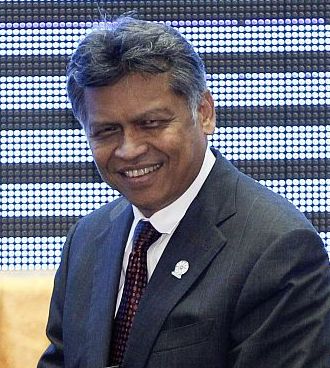Territorial disputes with China should unite Asean, says secretary general
PHNOM PENH — Territorial rows with China should bring the 10 members of the Association of Southeast Asian Nations (Asean) closer together than pull them apart, Asean secretary general Surin Pitsuwan said on Sunday
The Asean chief acknowledged the urgency of a united Asean stand in resolving the bloc’s disputes with China over the West Philippine Sea, or South China Sea, as tensions “are becoming closer to home.”
“The situation is going to push the Asean to move in one direction together, as the challenges are becoming much closer to home, affecting confidence, having some implications on foreign investment, concern about safety, and free access to the sea,” Surin told reporters.
The 21st Asean Summit and related Summits hosted by the Cambodian government opened formally on Sunday morning with President Benigno Aquino III in attendance in spite of a flu. He arrived at 8:40 a.m. Saturday on a Philippine Airlines flight.
His 53-member delegation includes Foreign Affairs Secretary Albert Del Rosario, Finance Secretary Cesar Purisima, Defense Secretary Voltaire Gazmin, Trade Secretary Gregory Domingo, Cabinet Secretary Jose Rene Almendras, Socio-Economic Planning Secretary Arsenio Balisacan, and Presidential Communications Operations Office Secretary Herminio Coloma Jr.
Article continues after this advertisementThe government said it allocated P11 million for the presidential trip to the Nov. 18 to 20 summit. US President Barack Obama and Chinese Premier Wen Jiabao are among the world leaders expected to descend on the Cambodian capital for the Asean summit and its related meetings.
Article continues after this advertisementAccording to Surin, it is clear that the world is paying much more attention than before to Asean. “This region is becoming more important than ever before, more critical to the word than five years ago or 10 years ago,” he said.
“It’s putting a sense of urgency on the Asean that we should move in the same direction. The Asean will coordinate, discuss, liaise with China, effectively moving forward into the future,” Surin said in a press conference at Peace Palace here.
Asean members Vietnam, the Philippines, Brunei and Malaysia, along with Taiwan, have overlapping claims on parts of the West Philippine Sea, while China claims virtually the whole body of water as its own, often sparking maritime tensions.
The West Philippine Sea is believed to hold vast deposits of oil and gas and is home to sea lanes through which half of the global trade passes.
In April, a standoff that lasted months occurred between Chinese and Filipino forces over the disputed Scarborough shoal off Zambales island in the Philippines.
Surin said the Asean foreign ministers who attended the Asean Foreign Ministers Meeting on Saturday, “expressed hope that we’ll get on with the work and we’ll have reciprocal enthusiasm from China to move forward,” especially in crafting a code of conduct (COC) for the negotiations.
“We’ve seen some hiccups along the way but both sides, all sides, committed to communicate the message to the global community that things are under control, and we’ll be able to work on the COC,” he said.
Surin said the new code of conduct would constitute “a collection of norms that are being used and being followed in other parts of world, as far as the open sea, the navigation, the security, safety, behaviors, the conduct of ships and vehicles going to any area in the open sea.”
“We expect them to be sanctified, to be binding, to be ratified, at the end of the process, whenever that is. We wold like to see the momentum going on forward on that issue,” he said.
At the meeting, Indonesia proposed the creation of a hot line for Asean on all emergency situations involving the West Philippine Sea.
“In the absence of COC, which is still in progress, in discussion, to avoid miscalculation, misleading of each other anybody in the high seas, Indonesia has come up with the idea to establish a communication channel” among the Asean members, Surin said.
“Call it a red line, give it a sense of urgency that if anything is developing, we all will be informed and we all will be activated into action, trying to consult, coordinate, contain any possible spillover of any accident, misunderstanding, miscalculation,” he said.
Surin said Indonesia’s proposal was pragmatic and practical, and would be helpful in managing any conflict situation in the high seas.
But the Asean leader said discussions by the foreign ministers did not make any specific reference to any issue beyond a general discussion on “how we’re going to manage the expectations, concerns, anxiety of the international community.”
For comprehensive coverage, in-depth analysis, visit our special page for West Philippine Sea updates. Stay informed with articles, videos, and expert opinions.
